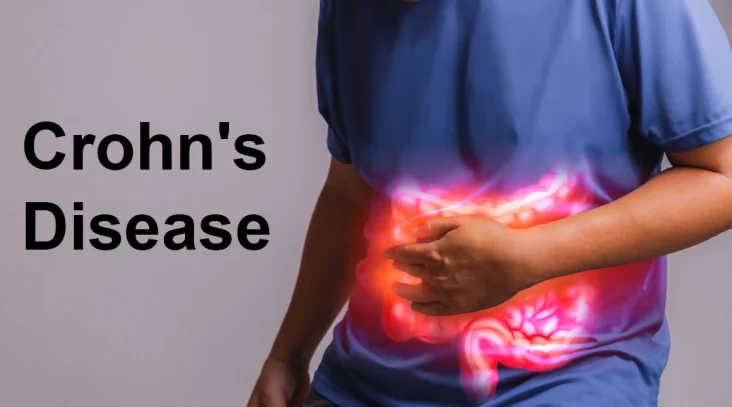Crohn’s disease is a chronic inflammatory condition that primarily affects the gastrointestinal tract. Named after Dr. Burrill B. Crohn, who first described the condition in 1932, Crohn’s disease is one of the two main types of inflammatory bowel disease (IBD), the other being ulcerative colitis. It can affect any part of the digestive system, from the mouth to the anus, but most commonly involves the small intestine and the beginning of the large intestine (colon).
Crohn’s Disease Symptoms
Crohn’s disease presents with a variety of symptoms that can range from mild to severe. These may include:
Abdominal pain and cramping: Often occurs in the lower right abdomen and can be persistent or intermittent.
Diarrhoea: Chronic diarrhoea is a common symptom and may be accompanied by blood or mucus in the stool.
Fatigue: Due to inflammation, malabsorption of nutrients, and the body’s immune response.
Weight loss: Resulting from reduced appetite, malabsorption, and inflammation.
Fever: Sometimes accompanied by night sweats, indicating systemic inflammation.
Rectal bleeding: May occur as a result of inflammation or ulceration in the intestines.
Perianal symptoms: Include fistulas (abnormal connections between the intestine and other organs) and abscesses.
Crohn’s Disease Causes:
The exact cause of Crohn’s disease is not fully understood, but it is believed to involve a combination of genetic, environmental, and immune system factors. Genetic predisposition plays a significant role, as individuals with a family history of the condition are at higher risk. Environmental factors such as diet, smoking, and microbial infections may trigger or exacerbate inflammation in susceptible individuals. Dysregulation of the immune system, where the body’s immune cells mistakenly attack the intestinal lining, also contributes to the development of Crohn’s disease.
Crohn’s Disease Diagnosis:
Diagnosing Crohn’s disease typically involves a combination of medical history review, physical examination, laboratory tests, imaging studies, and endoscopic procedures. Blood tests may reveal elevated inflammatory markers such as C-reactive protein (CRP) and erythrocyte sedimentation rate (ESR). Imaging techniques such as ultrasound, computed tomography (CT), magnetic resonance imaging (MRI), and endoscopy (including colonoscopy and upper endoscopy) can provide detailed visualization of the intestinal tract, helping to identify areas of inflammation, ulceration, and other characteristic features of Crohn’s disease.
Crohn’s Disease Treatment:
Treatment for Crohn’s disease aims to alleviate symptoms, induce and maintain remission, and prevent complications. The approach may involve a combination of medications, lifestyle modifications, nutritional support, and in some cases, surgery.
Medications:
Anti-inflammatory drugs: Such as corticosteroids, mesalamine, and immunomodulators (e.g., azathioprine, methotrexate) help reduce inflammation and suppress the immune response.
Biologic therapies: Target specific molecules involved in the inflammatory process, such as tumour necrosis factor-alpha (TNF-alpha) or integrins.
Antibiotics: May be prescribed to treat bacterial overgrowth or infections associated with Crohn’s disease.
Symptom relief medications: Such as anti-diarrheal drugs or pain relievers, may be used to manage specific symptoms.
Lifestyle modifications:
Dietary changes: Some individuals find relief from symptoms by avoiding certain trigger foods such as dairy, high-fibre foods, spicy foods, or alcohol.
Smoking cessation: Smoking has been linked to worsening of Crohn’s disease symptoms and complications, so quitting smoking is recommended.
Stress management: Stress can exacerbate symptoms in some individuals, so techniques such as relaxation exercises, meditation, or counselling may be beneficial.
Nutritional support:
In cases of malnutrition or nutrient deficiencies, dietary supplements or specialized enteral nutrition formulas may be recommended to support healing and overall health.
Crohn’s Disease Surgery:
Surgery may be necessary to manage complications such as strictures (narrowing of the intestine), fistulas, abscesses, or bowel obstructions that do not respond to medical treatment.
Crohn’s Disease Complications:
Crohn’s disease can lead to various complications, including intestinal strictures, fistulas, abscesses, malnutrition, vitamin deficiencies, bowel obstructions, and an increased risk of colon cancer. Additionally, inflammation and immune dysregulation associated with Crohn’s disease can affect other parts of the body, leading to complications such as arthritis, skin problems, eye inflammation, and liver disease.
Crohn’s disease is a chronic inflammatory condition of the gastrointestinal tract that can significantly impact the quality of life of affected individuals. While there is currently no cure for Crohn’s disease, ongoing research continues to improve our understanding of the condition and develop more effective treatments. With a combination of medications, lifestyle modifications, and supportive care, many individuals with Crohn’s disease can achieve symptom relief, maintain remission, and lead fulfilling lives. Close monitoring by healthcare providers and adherence to treatment plans are essential for optimal disease management and long-term well-being.

